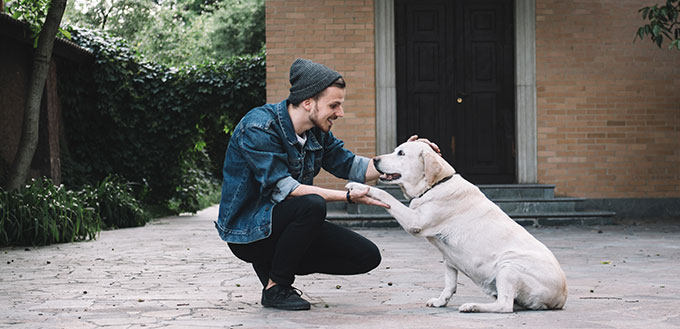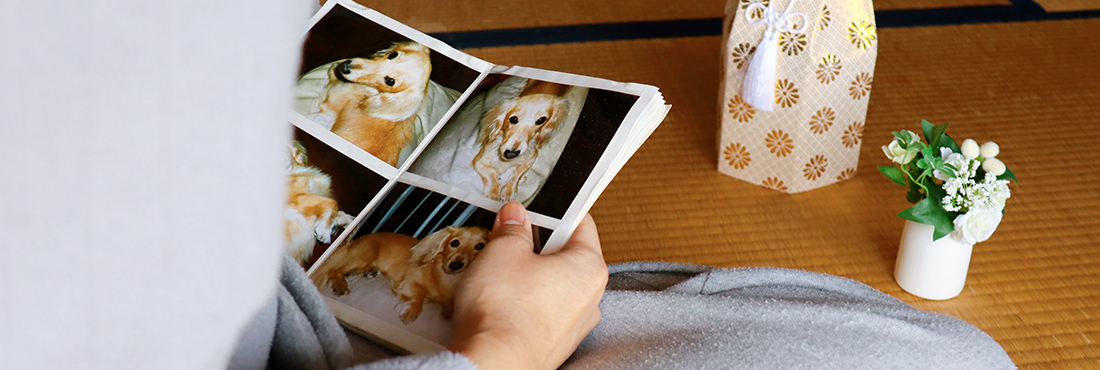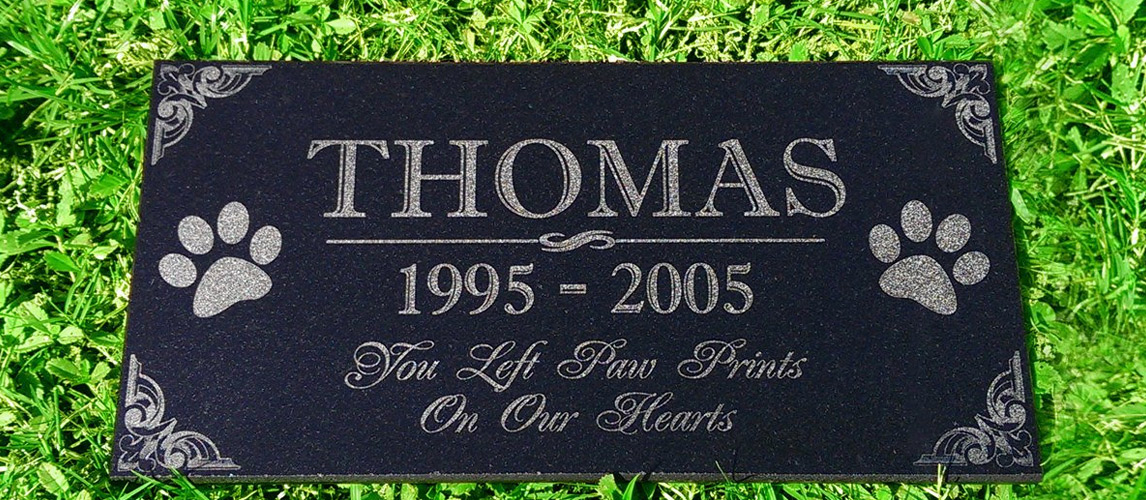Our pets are part of the family and the grief you feel when your faithful friend passes is a natural response to the loss. But when faced with the death of a pet, it can be overwhelming as you work through your emotions and learn to come to terms with losing such a beloved family member.
Grieving for your pet is perfectly normal and will get easier with time and some TLC. Here are our tips for you and other family members when it comes to how to get over the loss of a pet.
How to Deal With the Loss of a Pet
Your cat, dog, or other precious pet is a member of your family and generates feelings of love and protection that non-pet owners don’t always understand. The bond you can develop with an animal companion is truly special and the loyalty, love, and friendship you share is a joy like no other. So, when it comes to saying goodbye to your pet, the pain and sense of loss you feel can be devastating and you need to look for ways to cope.
For pet owners, there are no hard and fast rules to dealing with a bereavement, and how you grieve is an individual experience as you experience a roller-coaster of emotions, including denial, anger, guilt, depression, and ultimately acceptance. However, to be able to work through your loss and the grieving process, it is important to acknowledge your feelings and recognize that it is totally normal to feel such grief.
Here are some other key ways to cope with pet loss and ultimately say your goodbyes.
1. Give Yourself Time to Grieve
As the old saying goes, time is a great healer, and while you should be in no rush to put the grief experience behind you, giving yourself enough time to process your emotions and the trauma of pet loss is key to eventually being able to move on. And this applies to friends and family too.
In the immediate aftermath of losing a pet, your emotions are going to feel raw. If you are struggling with grief, then asking your employer for some time off as compassionate leave could be a good idea as it will help you deal with the initial shock as well as make any necessary arrangements.
2. Talk About Your Emotions
Keeping your emotions about the loss of a beloved pet bottled up can make the grieving process harder so it is important to find a way to express yourself and work through all your thoughts and feelings. Talking to someone who understands how important animal companions are and can empathize with your grief as a pet owner can be the best way to go, and it doesn’t have to be friends and family.
Look for someone who has a sympathetic ear or reach out to online pet communities or support groups where you can share your experiences with other like-minded people. And keeping a journal can be really cathartic as writing down your feelings may help you to understand and make sense of what you are going through.
3. The Importance of Self-care
The stress and trauma of losing a beloved pet can mean you start to neglect your own care and well-being, both physically and emotionally. And while you may just want to stay in bed, getting up and looking after yourself and eating well can help keep you strong as you deal with your loss of a dog, cat, or other pet.
Regular exercise can also make a difference as getting active will help to release those feel-good endorphins that can boost your mood.
4. Address Any Feelings of ‘Guilt’
Particularly if you had to make a difficult decision to end your pet’s suffering, guilt is a natural emotion to feel after losing a pet. But if left unaddressed, it can become a very negative feeling that can hamper your recovery while dealing with the loss of a pet.
Accepting that you did all you could to care for your pet and that they are no longer suffering is a good first step, as is acknowledging and being thankful for the pleasure and joy being their owner brought while they were alive, happy and healthy.
5. Maintain Your Other Pets’ Routine
If you have any other pets, it’s important not to neglect their emotional and physical needs as you work through your grief. Dogs and cats, in particular, can also sense loss if their furry playmate is suddenly no longer around, as well as pick up on your distress and sad emotions.
Maintaining their daily routine will not only keep things on an even keel for your animals but can also help you too as you spend quality time with them exercising and getting plenty of life-affirming cuddles.
6. Consider a Ceremony
If you and your family need a focus or a positive way to channel your grief, then a ceremony to mark your pet’s passing can help to bring an initial sense of closure and put you all on the path to healing. A funeral or ceremony for your pet will enable you all to come together and find comfort as you both say goodbye and celebrate the life of your much-loved pet.
It doesn’t need to be anything elaborate; a simple ceremony in your garden, yard or at your pet’s favorite outdoor place, perhaps to scatter their ashes or collectively mark their passing can be really cathartic and help with the bereavement process for you all.
You may find our article on Dog Cremation Cost helpful.
7. Help Children to Understand the Loss
If you have lost a family pet, your children will need support to work through their sadness in a way that makes sense to a youngster. It is important that you are honest with your child, as death is a natural part of life, and then give them the time and support they need to process the loss of their pet.
Reassure them, answer their questions as kindly and as honestly as you can, and don’t try to protect them by excluding them from what’s going on. Instead involve them, encouraging them to contribute to a farewell ceremony with a drawing, poem, or another creative way that can help your little one work through their feelings as they say their goodbyes.
Pet loss support groups can also help you with ideas on how to help your youngster understand how to cope with their grief.
8. Plan a Memorial
Your pet was an important part of your life and, even in death, you will still carry their memories with you. So having a memorial and creating a lasting legacy for your animal companion can eventually help to turn your sadness and grief into a place where you can you and other family members can remember all the happy times.
A memorial stone is a deeply personal way to commemorate your pet and keep them connected to your life, whether that’s in the garden or a favorite place you both shared. Or planting a tree in their memory during a memorial service can be equally effective.
And a good way as a family to start to heal during a pet bereavement is to collectively compile a remembrance book or photo album, full of your favorite pictures, stories, and mementos that enable you to remember your pet with happiness and love.
9. Get Extra Support if You Need It
Despite your best efforts, it can feel a hard slog when dealing with the loss of a beloved pet and you may struggle with your emotions or become overwhelmed with grief. If this happens, it is important that you don’t suffer in silence or just assume that other people won’t understand ‘as it was just a pet’.
When you lose a pet, your grief is real and if it starts to get too much, you should reach out for support, and even seek professional help. If you don’t know where to start, ask your vet, animal shelter or local animal charity for details of a nearby pet loss support group or pet loss hotlines.
Or look for a mental health professional qualified in bereavement support to help you talk through the grief process and a devise a strategy that supports your own mental health.
Guide for Older People
The loss of a pet on an older person can be particularly traumatic, especially if they are isolated and their pet was their main companion. As we age, we are also coming to terms with our own mortality and will experience some significant life changes, from the loss of friends, family, and pets as well as a reduction in independence, health, and mobility. Here’s our quick guide to helping older people through the pet loss grief process.
Keep Connected
In these circumstances, a pet will take on increased significance, from companion to even a therapy pet. Having a pet in older age can also boost our well-being, encouraging us to be more active, engaged and giving us a sense of purpose. So, when a pet dies it will be keenly felt by a senior person and they may need extra support as they come to terms with their loss.
Stay Active
It is important for the older person to stay active and connected with others following a pet bereavement, so they keep up their exercise and don’t become isolated. And having some activities such as volunteering have mental health benefits and can give a renewed sense of purpose that may have been lost when their precious pet dies.
Do You Ever Get Over Losing a Pet?
The simple answer is that while you may never fully get over the death of a pet, you will learn to accept and live with your loss, so you can look back on your precious time with your pet with fondness and happy memories.
How Long Does it Take to Recover From the Loss of a Pet?
Whether it is for a human or pet, the grieving process is a deeply personal thing and there is no set time limit for when you get over a bereavement. It could take weeks, months, or even years, but with the right support, an opportunity to work through your feelings, and keeping active, you will eventually reach a point where the pain will ease and you can look more positively forward.
Deciding When it’s Time to Get Another Pet
It can be tempting to rush out and fill the gap of your recently deceased pet by getting a new pet companion. However, many pet loss support experts don’t recommend getting a new pet so soon after losing your furry best friend as you won’t have had the time to come to terms with your grief.
Some people, particularly seniors, may also decide that they don’t want another pet and that is perfectly fine. But if you don’t like the idea of never having another pet to care for, how long you wait is totally personal to the individual.
For some, it could be just a few months before they feel emotionally strong and positive enough to welcome a new animal into their home; for others, it could be years. What is key for you and everyone in your family is to take your time and decide when the time is right. And for both you and your new pet, it’s important to not see your new companion as a replacement for your previous animal but as a beloved pet in its own right.
By remembering your lost pet with love and fondness while respecting and loving your new pet for who they are, you can then move forward and continue the wonderful journey that is being a pet parent.
Sources:
- Coleen A. Ellis, Coping With The Loss Of A Pet, American Veterinary Medical Association
- Caregiver Support, The MSPCA–Angell
- End of Life Care, The ASPCA
- Pet Loss and Grief Resources, Best Friends Animal Society










